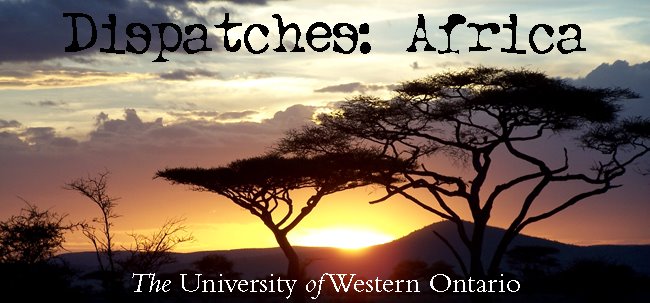 Mwanza, Tanzania - Without question, the days painted with the experience of visiting various towns and communities have thus far proved to be the most rewarding – both personally and professionally. Being among the people has provided unparalleled opportunities for seeing how other people live, and also for how much we have to be thankful. The sights. The smells. The sounds. The feelings. Our senses are alive and being pulled in so many directions.
Mwanza, Tanzania - Without question, the days painted with the experience of visiting various towns and communities have thus far proved to be the most rewarding – both personally and professionally. Being among the people has provided unparalleled opportunities for seeing how other people live, and also for how much we have to be thankful. The sights. The smells. The sounds. The feelings. Our senses are alive and being pulled in so many directions.Today, we visited the birthplace of the Western Heads East project in Africa – the Mabatini community kitchen. Before we had the chance to do so, however, we had a successful meeting with Regional Administrative Secretary Alhaji Yhya Mbila, who cleared space in his morning schedule to meet with us at the prompting of Amran Batenga, Chairman of the regional Chamber of Commerce, with whom we met last night.
Our objective during the meeting was to increase awareness of, and generate increased support from government for, the Western Heads East project. “We all out support it; we’re talking about AIDS, which is a big threat,” Mbila said. “Mwanza is the hub,” he began, telling us that the lake region is home to 30 per cent of the country’s population. “Historically, we have competition economically with Kenya and Uganda, but invariably, we are the best.” While he previously had little knowledge of the project, he was sufficiently impressed that he promised to visit the community kitchen over the next month to experience it first hand.
Which is what we did next. Greeted by the mamas, who were all wearing green Western Heads East T-shirts (which read, on the back, “How can a cow fight HIV? Western Heads East”) along with their traditional kitenge, we were given portions of the probiotic yogurt that has helped them build their reputation in the community. Though we eventually added a little bit of sugar, it tasted quite good.
The mamas’ kitchen is a small room with turquoise walls and a mural depicting the community engaged in the yogurt making process on one wall. Awash with green plastic containers, a small floortop stove, a refrigerator, other tools and a table for distribution, the kitchen will need to be expanded to increase opportunities for sustainability. The village of Mabatini is dry and set into the hills with dirt roads and people everywhere. Most of the buildings are stone and the wind whips down the laneways, carrying with it dust and the excited trills of children. I look forward to revisiting the community over the next week or so and seeing more of it. It was an amazing experience.
 Following our time in the kitchen, we are treated to a cultural experience as the local Tunda Sana theatre troupe ushered us in as honoured guests to watch a series of performances aimed at teaching people about HIV/AIDS through drama. While I likened it in my head to opera – which you don’t necessarily need to understand the lyrics to enjoy – we had an interpreter and were truly blown away by the performance, and the experience. Following the main morality plays, the audience was engaged to ask questions of the actors, who remained in character while providing their responses. It struck me how this encouraged important discussion among the group, and was impressed by the actors’ ability to reply in metaphor. On one such occasion, for example, an actor portraying a philandering girlfriend was asked, “Why have more than one boyfriend,” to which she replied, “You can’t live on the same diet of rice.” This also happened to be the one time an actor had no answer to the follow-up question: “If you need change in your diet, why not women?” I also thought that was a pretty enlightened question for this area. The session wrapped up with a traditional African dance, which was also a tremendous, unexpected experience.
Following our time in the kitchen, we are treated to a cultural experience as the local Tunda Sana theatre troupe ushered us in as honoured guests to watch a series of performances aimed at teaching people about HIV/AIDS through drama. While I likened it in my head to opera – which you don’t necessarily need to understand the lyrics to enjoy – we had an interpreter and were truly blown away by the performance, and the experience. Following the main morality plays, the audience was engaged to ask questions of the actors, who remained in character while providing their responses. It struck me how this encouraged important discussion among the group, and was impressed by the actors’ ability to reply in metaphor. On one such occasion, for example, an actor portraying a philandering girlfriend was asked, “Why have more than one boyfriend,” to which she replied, “You can’t live on the same diet of rice.” This also happened to be the one time an actor had no answer to the follow-up question: “If you need change in your diet, why not women?” I also thought that was a pretty enlightened question for this area. The session wrapped up with a traditional African dance, which was also a tremendous, unexpected experience.Looking out at a rainbow arcing over Lake Victoria, I feel almost like I have found the pot of gold of experience; this has also been another amazing day.


No comments:
Post a Comment